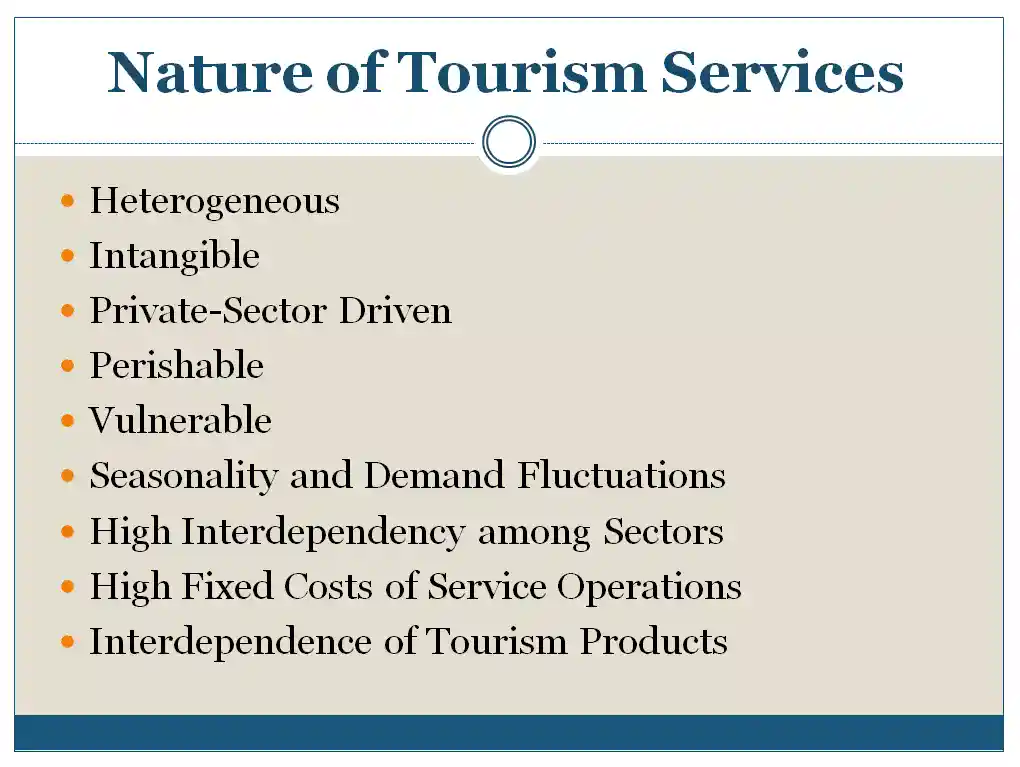Table of Content:-
Tourism Services Meaning
Tourism services play an important role in the global travel industry. It caters to the various needs and wants of travellers worldwide.
Tourism is currently one of the fastest-growing industries worldwide. It is primarily a service Industry as it does not produce goods but it focuses on providing services to a wide range of individuals across different social classes. Tourism encompasses a blend of interconnected industries and trades, including the hotel and transport sectors.
It is a complicated business as it involves multiple socio-economic activities like attracting people to a destination, transporting them, housing, feeding and entertaining them, etc. In the process, it brings about tremendous infrastructural improvements and contributes to the overall development of the region. Tourism is one of the few industries that generate foreign exchange without exporting national wealth.
Tourism encompasses the activity of travelling between places for leisure, business, or other purposes. From one country to another for performing a specific task or it is a visit to a place or several places for entertainment which leads to an awareness of other civilisations and cultures, also increasing the knowledge of cultures, countries, cultures and history.
The tourism industry comprises the activities of individuals who travel to and reside in locations different from their regular surroundings, typically for a duration of up to six consecutive months but not less than 24 hours. This travel can be undertaken for leisure, business, or various other reasons unrelated to performing a paid activity within the destination. In simple terms, tourism is the act of travel for pleasure, leisure, or business and the provision of services for this act.
Related Articles:
- nature of business meaning
- nature of international business
- scope of international marketing
- determinants of economic development
- nature of capital budgeting
- nature of international marketing
Nature of Tourism Services
The nature of tourism services is as follows:
1) Heterogeneous
The tourism product is not homogeneous. We cannot standardise a service. Hotels attempt to standardise their room and service delivery as efficiently as possible through staff training and quality control procedures, but the human ingredient complicates the equation. Due to the nature of services that involve interactions between producers and consumers, each with their unique expectations, the perception of any product by all customers remains unlikely. External factors can also affect the overall tourist experience. A bumpy flight can spoil a delightful overseas journey.
2) Intangible
Tourism products, like all services, are intangible. They cannot be seen, felt, touched, or sampled before purchase.
3) Private-Sector Driven
Governments provide relatively little assistance to the tourism industry. The hotel industry has staged a long, hard battle to gain recognition as a service exporter such that it can be deserving of export grants. In most instances, the entrepreneur is responsible for their survival. Having said that, it is governments that shape the environment in which the industry operates. They provide much of the infrastructure and services used by tourists and the industry generally includes promotion and information technology services, the provision of roads, airports, railways and harbours, the management of national parks, visas and customs services, research and statistical data, education and training programmes and various public amenities.
4) Perishable
Tourism products are perishable. They cannot be stored for later use, unlike intangible products. Hence the prevalence of discounting in services. This leads to the major problem confronting the tourism operator-namely, demand fluctuation.
5) Vulnerable
Tourism is more vulnerable than any other industry to seasonal changes in demand. Demand fluctuation can be unseen, sometimes due to natural causes, others artificial. Acts of God include natural disasters and climate. Acts of Man include strikes (domestic pilots’ strike) international events (Gulf War) and murders (tourist murders in Florida).
6) Seasonality and Demand Fluctuations
In the realm of leisure tourism, it is a common trait for demand to experience significant fluctuations throughout the different seasons of the year. As a result, the occupancy rates of many tourism businesses increase to 90 to 100 per cent during the peak season but drop to 30 per cent or less during the off-peak season. In addition, it is quite common for many leisure tourism businesses to undergo seasonal closures. These demand variations in tourism are more important because of perishability. That is why, generating demand when there is less demand, is a primary concern for marketing managers.
7) High Interdependency among Sectors
A feature of tourism is its high degree of interrelatedness. For example, resort or hotel development cannot begin without adequate airports and roads to bring tourists to those properties.
8) High Fixed Costs of Service Operations
In the travel and tourism industry, it is generally the case that the operations have high fixed costs and comparatively lower variable costs. This fact focuses all service operators’ on the imperative of generating additional demand. Most large-scale businesses are obliged to function within a very narrow margin between total cost and total revenue. Therefore, even a slight variation of one percentage point in average load factors can determine whether a company may achieve profit or loss.
9) Interdependence of Tourism Products
To ensure a seamless vacation experience for a vacationer, all organizations involved in the tourism industry need to operate in perfect coordination. All organisations should function in coordination. The fortunes of tourist attractions in a destination are linked. Since a vacationer chooses attractions at a destination together with the products of transport, accommodation, catering, etc.,

Tourism Service Marketing Strategies
Travel and tourism have become a global industry and are widely considered one of the fastest-growing, if not the fastest-growing, sectors globally. It ranks as the largest industry in the world in terms of employment (one out of every 16 employees worldwide) and ranks in the top two or three drives in almost every nation on nearly every measure.
Thus the travel and tourism industry has become a major contributor to the gross national product of many nations, with marketing tourist destinations and their products becoming a widely recognised practice for both private and public sector organisations. The marketing concept is based on a “long-term commitment” to the satisfaction of travellers’ needs and motives and for a more strategic marketing approach instead of relying on operational measures such as marketing communication.
